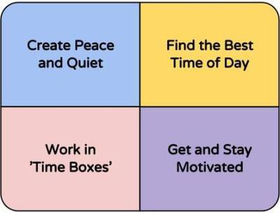Developing Good Homework & Study Habits

- Create an environment that is conducive to doing homework starting at a young age. Children need a consistent work space in their bedroom or another part of the home that is quiet, without distractions, and promotes study.
- Schedule ample time for homework; build this time into choices about participation in after school activities.
- Establish a household rule that the TV and other electronic distractions stay off during homework time.
- Supervise computer and Internet use.
- By high school, it's not uncommon for teachers to ask students to submit homework electronically and perform other tasks on a computer. If your child doesn't have access to a computer or the internet at home, work with teachers and school administration to develop appropriate accommodations.
- Be available to answer questions and offer assistance, but never do a child's homework for her.
- Take steps to help alleviate eye fatigue, neck fatigue and brain fatigue while studying. It may be helpful to close the books for a few minutes, stretch, and take a break periodically when it will not be too disruptive.
- If your child is struggling with a particular subject, speak with your child's teacher for recommendations on how you or another person can help your child at home or at school. If you have concerns about the assignments your child is receiving, talk with their teacher.
- If your child is having difficulty focusing on or completing homework, discuss this with your child's teacher, school counselor, or health care provider.
- For general homework problems that cannot be worked out with the teacher, a tutor may be considered.
- Some children need extra help organizing their homework. Checklists, timers, and parental supervision can help overcome homework problems.
- Some children may need help remembering their assignments. Work with your child and their teacher to develop an appropriate way to keep track of their assignments – such as an assignment notebook, or in their cell phone.
